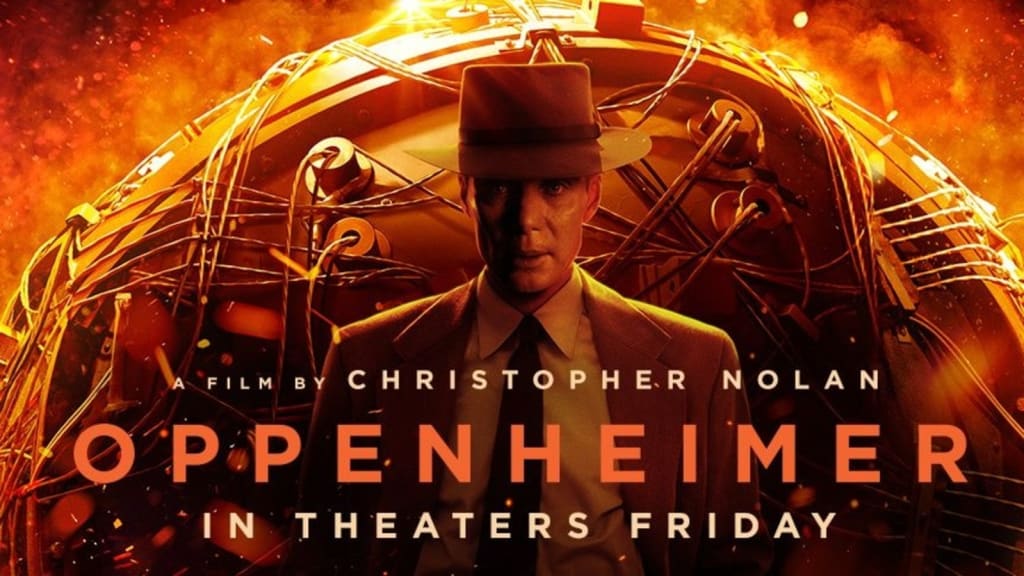Oppenheimer
Oppenheimer: The Architect of the Atomic Age"?

---
Christopher Nolan’s "Oppenheimer" is a cinematic tour de force that delves deep into the life of J. Robert Oppenheimer, the brilliant physicist known as the father of the atomic bomb. Released in 2023, the film presents a multifaceted portrait of a man whose genius and ambition led to both monumental scientific breakthroughs and profound ethical dilemmas. Through meticulous storytelling and stellar performances, Nolan crafts a narrative that is both intellectually stimulating and emotionally gripping.
**Plot and Structure**
"Oppenheimer" is not a straightforward biopic. Nolan employs a non-linear narrative structure, a technique he has mastered in his previous works like "Memento" and "Inception." The film oscillates between various timelines, juxtaposing Oppenheimer’s early academic pursuits, his role in the Manhattan Project, and the subsequent fallout of his scientific achievements. This fragmented storytelling mirrors the complexity of Oppenheimer's character and the era he lived in.
The movie begins with Oppenheimer’s formative years at Cambridge, where his encounter with theoretical physics sets him on a path that will change history. As the narrative unfolds, we see his recruitment by General Leslie Groves to lead the top-secret Manhattan Project during World War II. The tension builds as the project progresses, culminating in the first successful detonation of an atomic bomb in New Mexico. The aftermath of this event, both personal and political, forms the crux of the film’s second half.
**Character Development and Performances**
Cillian Murphy delivers a career-defining performance as J. Robert Oppenheimer. He embodies the physicist’s intellectual brilliance, moral ambiguity, and inner turmoil with a nuanced portrayal that captures the essence of a man torn between his scientific aspirations and the ethical implications of his work. Murphy’s portrayal is both sympathetic and haunting, offering a window into Oppenheimer’s soul.
The supporting cast is equally impressive. Emily Blunt plays Katherine “Kitty” Oppenheimer, Robert’s wife, with a fierce determination and emotional depth. Her performance highlights the strain that Oppenheimer’s work and the ensuing controversy placed on their family life. Matt Damon, as General Leslie Groves, provides a grounded and pragmatic counterpoint to Oppenheimer’s idealism. Robert Downey Jr. shines in a surprising dramatic role as Lewis Strauss, a key figure in the political machinations that sought to undermine Oppenheimer in the post-war years.
**Themes and Ethical Questions**
At its core, "Oppenheimer" is a film about the moral and ethical quandaries of scientific discovery. The development of the atomic bomb represents a watershed moment in human history, and Nolan does not shy away from exploring the profound consequences of this invention. The film raises pressing questions about the responsibility of scientists, the ethics of warfare, and the intersection of science and politics.
Nolan deftly portrays Oppenheimer’s internal conflict. The exhilaration of scientific achievement is juxtaposed with the horror of its applications, embodied in the harrowing scenes of the bombings of Hiroshima and Nagasaki. The film does not offer easy answers but instead invites the audience to grapple with the same questions that plagued Oppenheimer.
**Visual and Cinematic Excellence**
Visually, "Oppenheimer" is a masterpiece. Nolan’s collaboration with cinematographer Hoyte van Hoytema results in a film that is both visually stunning and thematically rich. The use of IMAX cameras captures the grandeur of the Los Alamos landscape and the visceral impact of the atomic explosions. The visual effects are meticulously crafted, providing a realistic and immersive experience without resorting to excessive CGI.
The film’s production design, by Nathan Crowley, faithfully recreates the period, from the austere laboratories of the Manhattan Project to the opulent hearings of the Atomic Energy Commission. The attention to detail extends to the costumes, which reflect the evolving fashions of the 1930s through the 1950s, adding an additional layer of authenticity.
**Sound and Score**
The sound design in "Oppenheimer" is another standout aspect. The auditory experience of the atomic blast is particularly noteworthy, capturing both the deafening roar and the eerie silence that follows. Composer Ludwig Göransson’s score complements the narrative, blending haunting melodies with dramatic crescendos that heighten the film’s emotional impact.
Göransson’s music underscores the tension and urgency of the Manhattan Project while also providing a poignant backdrop to Oppenheimer’s personal struggles. The score is both grand and intimate, mirroring the dual nature of Oppenheimer’s story as both a public triumph and a private tragedy.
**Historical Accuracy and Artistic License**
While "Oppenheimer" strives for historical accuracy, Nolan also takes certain artistic liberties to enhance the narrative. The film is based on the Pulitzer Prize-winning biography "American Prometheus: The Triumph and Tragedy of J. Robert Oppenheimer" by Kai Bird and Martin J. Sherwin. Nolan’s script distills the complex events of Oppenheimer’s life into a cohesive and compelling story, though some details are streamlined or dramatized for cinematic effect.
For instance, the interpersonal dynamics and political intrigues surrounding Oppenheimer’s security clearance hearings are depicted with heightened drama, emphasizing the betrayal and paranoia of the Cold War era. These choices serve to underscore the broader themes of the film and provide a more engaging viewing experience, even if they sometimes blur the line between fact and fiction.
**Critical Reception and Impact**
Upon its release, "Oppenheimer" received widespread critical acclaim. Critics praised Nolan’s direction, the performances, particularly Murphy’s, and the film’s thought-provoking exploration of its subject matter. Some have called it Nolan’s most mature and ambitious work to date, a film that challenges its audience intellectually and emotionally.
The film also sparked renewed interest in J. Robert Oppenheimer and the ethical implications of the atomic age. It serves as a timely reminder of the potential and peril of scientific advancement, a theme that resonates in today’s world of rapid technological progress and geopolitical tension.
**Conclusion**
"Oppenheimer" is a remarkable achievement in filmmaking. It combines Christopher Nolan’s signature style with a profound exploration of historical and ethical themes. The film’s non-linear narrative, stellar performances, and technical excellence make it a compelling watch from start to finish. Cillian Murphy’s portrayal of J. Robert Oppenheimer is a standout, capturing the complexities of a man who changed the course of history.
The film invites viewers to reflect on the responsibilities of scientists and the consequences of their work, making it not just a historical drama but a meditation on the human condition. "Oppenheimer" is a film that will be remembered not only for its cinematic brilliance but also for its thoughtful engagement with one of the most consequential figures of the 20th century.
In a time when the role of science and technology in society is more crucial than ever, "Oppenheimer" serves as both a cautionary tale and a tribute to the relentless pursuit of knowledge. It is a film that demands to be seen, discussed, and remembered.
---
I hope this review meets your requirements! If you need any adjustments or additional details, feel free to let me know.
About the Creator
Enjoyed the story? Support the Creator.
Subscribe for free to receive all their stories in your feed. You could also pledge your support or give them a one-off tip, letting them know you appreciate their work.





Comments
There are no comments for this story
Be the first to respond and start the conversation.